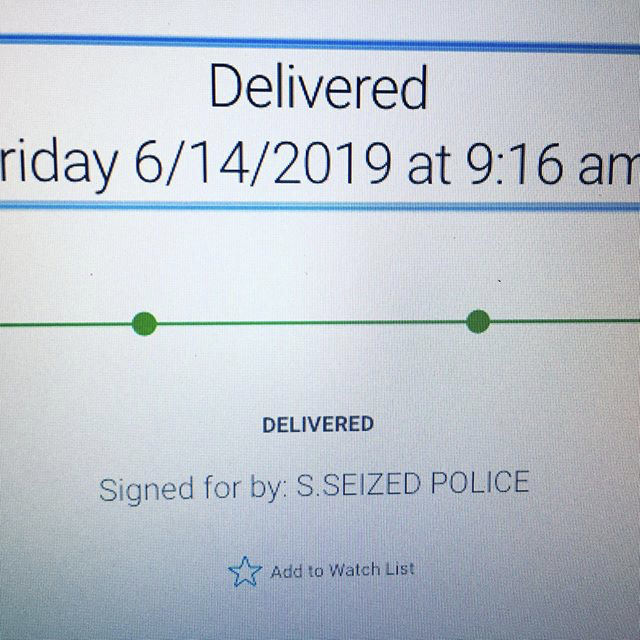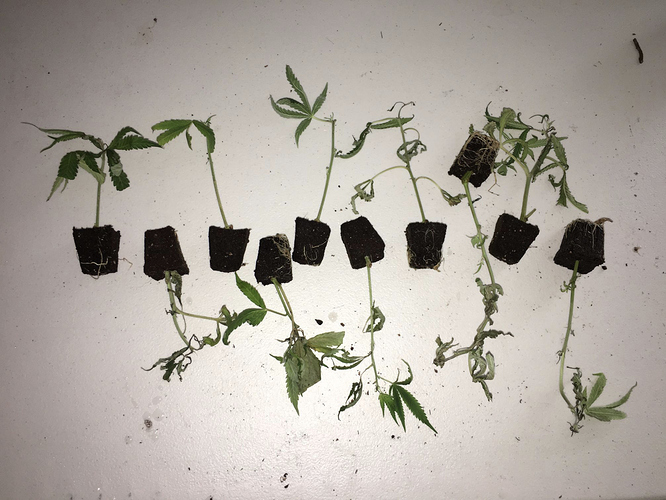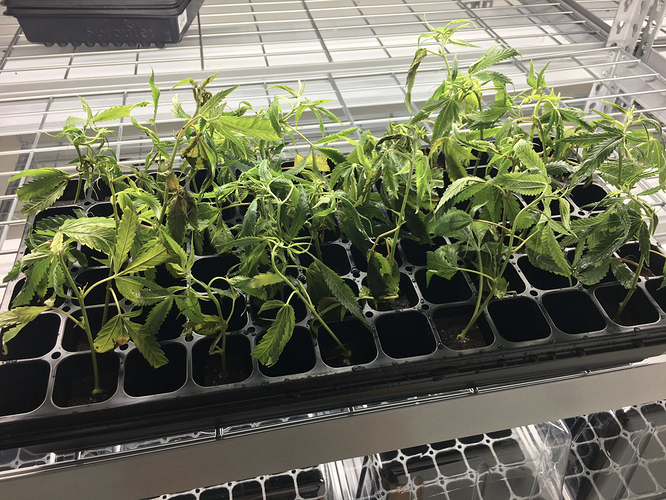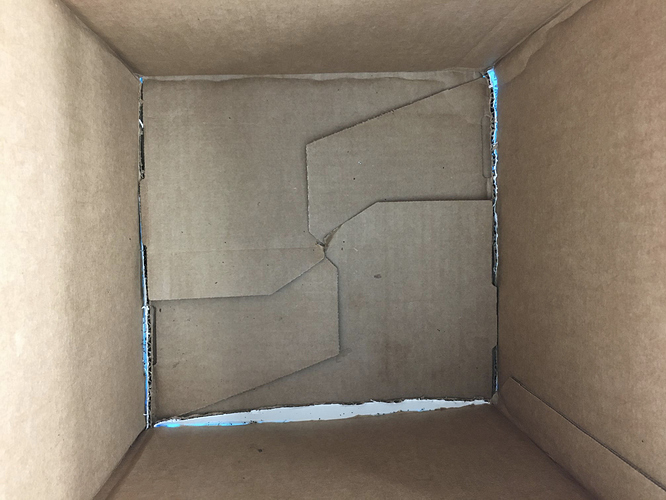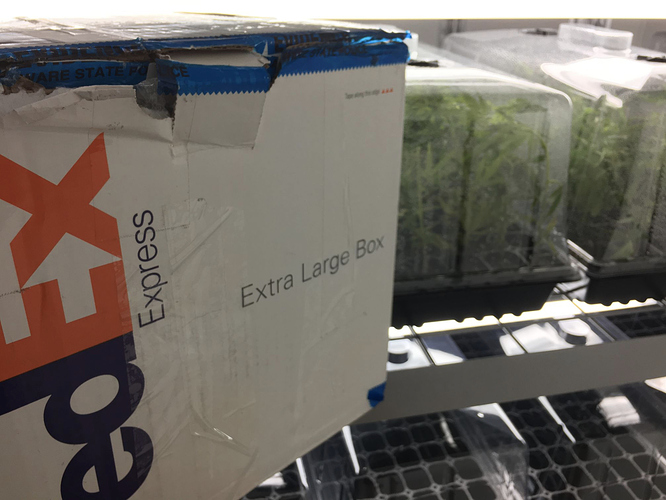Strongly advise against FedEx, especially since USPS is ok (as long as you save records for two years). If you get your product seized, definitely try asking for it back… nicely, persistently, and only using laws and logic… and that’s no guarantee, sadly. I truly feel for everyone who has had to deal with this, and @anon1342 makes a damn good point for protecting against seizures involving USPS… so here’s the script I read on a conference call with DSP to get our plants back from their evidence lockup…
9am, Friday morning, DSP seized 140 of our plants while they were en route to Maryland from North Carolina (via FedEx). The troopers disregarded the certificates of authenticity that were included in the shipment, and have taken our property without due diligence or due process. Neither myself nor the seller were contacted in an attempt to validate the contents of our shipment. The only information we received was a FedEx signature comment that read “seized by police.”
FedEx explained that two State Troopers (from DSP Troop 2) took custody of our shipment during a “routine” inspection. 9pm Friday night, I called DSP Troop 2 and informed Corporal X that I was on my way to recover our plants. When I arrived at DSP Troop 2, I met with Sergeant X, and we spoke at length about the origin of the package and its contents. Sergeant X said; “we don’t know the difference between marijuana and hemp.” I thoroughly explained that hemp is everything under 0.3% D9THC and marijuana is everything over 0.3% D9THC.
After educating Sergeant X on the difference between hemp and marijuana, I provided him with a folder containing copies of all relevant documentation, and then proceeded to cite Federal law:
• No State or Indian Tribe shall prohibit the transportation or shipment of hemp or hemp products produced in accordance with subtitle G of the Agricultural Marketing Act of 1946 (as added by section 10113) through the State or the territory of the Indian Tribe, as applicable.
After citing Federal law, I cited Delaware law:
• “Industrial hemp” means the plant Cannabis sativa L. and any part of such plant, whether growing or not, with a delta-9 tetrahydrocannabinol concentration of not more than 0.3 percent on a dry weight basis.
After citing Delaware law, I cited Maryland law:
• ”Industrial hemp” means the plant Cannabis sativa L. and any part of such plant, whether growing or not, with a delta–9–tetrahydrocannabinol concentration that does not exceed 0.3% on a dry weight basis.
After citing Maryland law, I cited North Carolina law:
• Industrial hemp. – All parts and varieties of the plant Cannabis sativa (L.), cultivated or possessed by a grower licensed by the Commission, whether growing or not, that contain a delta-9 tetrahydrocannabinol concentration of not more than three-tenths of one percent (0.3%) on a dry weight basis
After presenting proof (beyond a reasonable doubt) that our shipment was legitimate, the State of Delaware conversely determined that it was not. DSP maintains that our plants tested positive for (what they claim is) THC, and for this reason alone they are refusing to release our package.
Every official source has claimed “the plants tested positive for THC,” but this is relatively improbable for a number of scientific reasons:
• Hemp clones are alive and must be dehydrated/dried before testing for D9THC.
• Hemp plants with less than 0.3% D9THC (at full maturity) are biologically incapable of producing more than 0.3% D9THC (at two weeks of age).
• Presumptive testing for marijuana is not a valid substitute for presumptive testing for hemp.
• Only DEA-approved laboratories (with a GCMS or HPLC) are legally capable of testing Schedule-1 narcotics… specifically, the presence of a unique compound (like THC).
In fact, a presumptive test for “hemp” does not yet exist, and therefore, it is my interpretation that any “hemp” result obtained from a “marihuana” field test kit (both positive and negative) is unequivocally invalid. It is also my understanding that a federal ruling against field testing for cannabis sativa L. (to include hemp and marijuana) may have implications reaching far beyond our industry… perhaps even a moratorium cannabis sativa L. field tests altogether.
If I put heroin in a marijuana test kit, and it tests positive, does that make it marijuana? No
If I put cocaine in a marijuana test kit, and it tests positive, does that make it marijuana? No
So if I put hemp in a marijuana test kit, and it tests positive, does that make it marijuana? No
According to the farm bill of 2018, the term ‘marihuana’ does not include hemp, as defined in section 297A of the Agricultural Marketing Act of 1946.
The term ‘hemp’ means the plant Cannabis sativa L. and any part of that plant, including the seeds thereof and all derivatives, extracts, cannabinoids, isomers, acids, salts, and salts of isomers, WHETHER GROWING OR NOT, with a delta-9 tetrahydrocannabinol concentration of NOT MORE THAN 0.3 percent on a DRY WEIGHT basis.
Judges are consistently misled to believe that hemp and hemp products were field tested by police and presented a preliminary positive result for THC, but that’s factually incorrect. ‘Marihuana’ field tests can only qualify the presence of cannabinoids, and cannot quantify the percentage of any single cannabinoid. Therefore, a plant with zero THC and any amount of CBD, CBN, or CBG (all of which are legal if derived from hemp plants) will absolutely fail the presumptive test and present a false positive result… of which prosecution is enabled (and in most cases required).
This theory was confirmed by testing non-cannabis (plant-based) products that naturally produce cannabinoids.
The marihuana field test is well known to present a false positive in the presence of any cannabinoid, of which there are at least 60 unique cannabinoids in the cannabis species.
The DEA has quietly acknowledged that there are no field tests that can differentiate between hemp and marijuana:
“The purpose of this notice is to gather information to determine if there are vendors in the marketplace capable of providing field test kits (color tests, instruments, etc.) that can distinguish between hemp (non-controlled cannabis with a THC content of less than 0.3%) and marijuana (federal controlled cannabis with a THC content above 0.3).”
DSP does not have the capacity to quantitively test for THC in the field.
DSP does have the capacity to qualitatively test for cannabinoids in the field.
DSP has made an honest mistake and should return our property today.
and within 24 hours, 70% were back home… albeit somewhat fucked. they recovered, and so did we!
this is why we don’t ship FedEx unless USPS can’t deliver - I still love the FedEx local drivers tho!
Lawsuits can get expensive because they have unlimited resources to hold your product and/or property. Good luck Steve, let me know if I can help!
